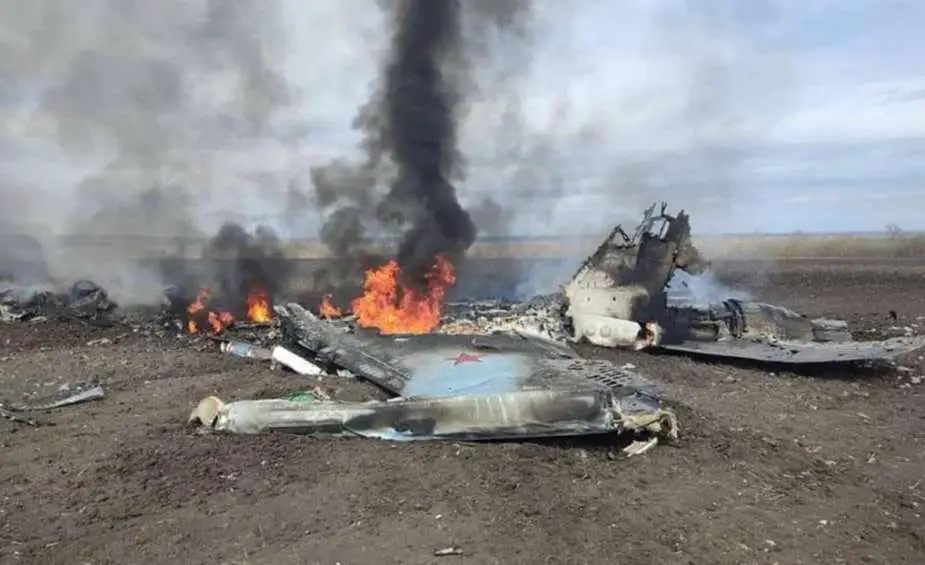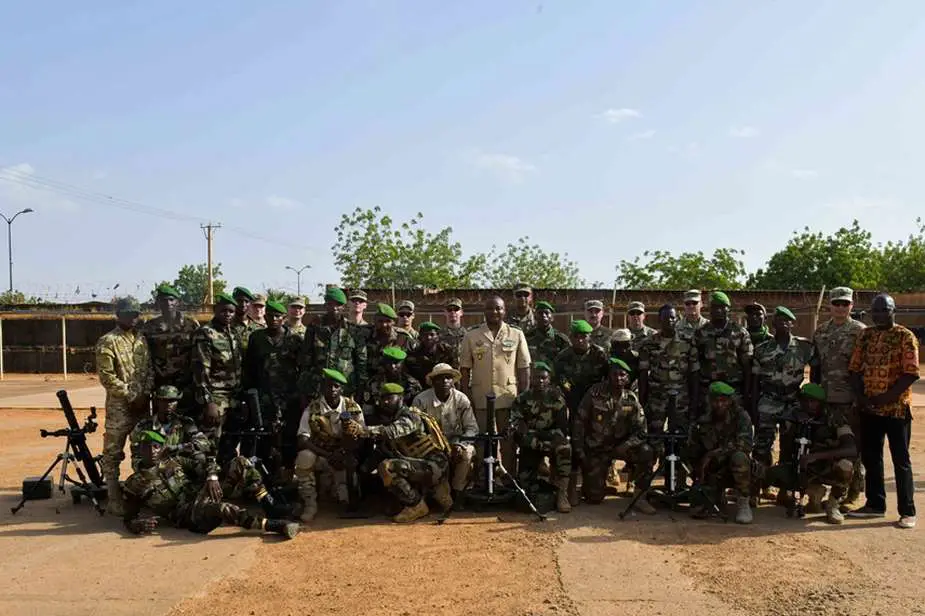Breaking news
US Europe-Africa Air Force Chief draws lessons from war in Ukraine and rising tensions in Niger.
The U.S. Air Forces Europe and Africa are learning lessons from the Russian invasion of neighboring Ukraine to develop strategies, capabilities and tactics needed to better defend the NATO nations, Air Force Gen. James B. Hecker told the Defense Writers' Group on August 18. Hecker, speaking from his headquarters at Ramstein Air Base, Germany, also discussed the situation in Africa. Jim Garamone, U.S. DoD, reports.
Follow Army Recognition on Google News at this link

U.S. Air Force Gen. James B. Hecker said Ukrainians shot down at least 75 Russian aircraft before the Russians changed tactics (Picture source: Ukrainian MoD)
Russia's unprovoked invasion of Ukraine in February 2022 has given NATO leaders a view into President Vladimir Putin's military machine. "It has given us the opportunity to take a look and learn some lessons from what's going on in the last year and a half," Hecker told reporters. "I think, by far, the largest lesson that we've learned is that neither side was able to get air superiority. I think we all thought that Russia would get it within a couple of days, and we'd be looking at a 10-day war."
Ukrainian counter-air capabilities were up to the task. The general said Ukrainians shot down at least 75 Russian aircraft before the Russians changed tactics. Many were knocked down by shoulder-fired, anti-aircraft weapons, he said. Russian forces charged to the suburbs of Ukraine's capital of Kyiv before the Ukrainian military pushed them back. Had the Russians gained air superiority, it may have been a totally different picture. "But since they weren't able to do that, we end up with a fight that we have today ... we haven't seen one like this probably since World War I," the general said.
The war devolved to an artillery duel with the Russian military indiscriminately firing into civilian areas of Ukraine. "What we've seen out of the Russian side, is they have gone to solely using one-way they get very cheaply from Iran, or they use cruise missiles off of their bombers that they launch from thousands of miles away," he said. Both Ukraine and Russia have significant, integrated air and missile defense systems. These surface-to-air missiles prevented either side from establishing air superiority.
"My No. 1 priority—and throughout NATO—on the air side is to counter the anti-access, area-denial mission," he said. "We've been putting a lot of effort on improving our skills and working with all of the allies to do that."
The general said his second priority is countering how Russia fights when it can't get air superiority. The Ukrainians have been very good at knocking down the one-way UAVs and cruise missiles, and NATO nations need to improve their capabilities, as well, he said.
"My third priority is information sharing," Hecker said. "It's amazing what you can do if you share information amongst your allies—and how much better and capable you make each other really at zero cost. It's just a policy change, but an important one."
He said the Air Force also needs to invest in and exercise the agile combat employment capability. ACE, as it is called, is about dispersing aircraft and high-value equipment to safeguard deterrence. "As weapons get a lot more accurate, they can just hit every single aircraft even if it's dispersed," Hecker said. "What we have to do now is disperse our aircraft amongst different airfields and potentially even on highways."
He said his final priority is command and control, which is complicated by the ACE concept. "How are we going to command and control all these units, especially if they're taking off and landing at other airfields using the ACE concept?" he asked. "How are we going to make that happen?"
Operating in the face of cyberattacks also complicates this situation.
Nigerien Gen. Abdourahamane Tchiani, the former chief of the country's Presidential Guard, seized power from Nigerien President Mohamed Bazoum on July 26. The U.S. Department of Defense has consequently paused military training in Niger and has also paused some additional security cooperation efforts as officials continue to monitor events on the ground. The United States has roughly 1,000 personnel in Niger. "If our civilian leaders decide that they want us out there, then obviously we have we've been doing planning for that, and we'll be ready to get us out there," U.S. General Hecker (AFRICOM) said.
Taking troops and capabilities from the nation would have an effect on counterterrorism operations in and around the Lake Chad region. "But we will obviously look for some other allies that are in that we could maybe partner up with and then move our assets there," he said.
The general stressed that no decision has been made, and plans are just a prudent precaution. "What we hope for is that we have a peaceful diplomatic solution to this, and we don't have to move," he said.

U.S. Army Soldiers assigned to Headquarters and Headquarters Company, 1st Battalion, 102nd Infantry, 86th Infantry Brigade Combat Team, in support of the Combined Joint Task Force-Horn of Africa (CJTF-HOA), pose for a group photo during a graduation ceremony at Niamey, Niger, June 9,2021. Soldiers learned all mechanical actions of the 60mm mortar systems to effectively employ mortars during the month-long training event (Picture source: U.S. Army/Sgt Brandon Julson)
U.S. strategy in Africa
In spite of former US President Trump's declaration of a plan to withdraw US forces from Africa, there has been a continuous and uninterrupted engagement by the United States on the continent, as noted by V. Albia in an article on dailypost.ng. The presence of the US military in Africa is steadily growing. It commenced with an agreement to conduct joint military exercises, then expanded to include the acquisition of military facilities at airports and ports. This progression culminated in an accord to establish expansive, all-encompassing military bases, which the US intends to utilize to wage war against entities it deems as adversaries.
AFRICOM professes its objective to ensure stability and combat terrorism, yet beneath the surface, it is solidifying the United States' political and military foothold within the continent. This entails creating an equilibrium and potentially encircling other global powers. Washington's focus on Africa has intensified, and several pivotal African nations are hosting US military presence on their territories. These countries encompass Burundi, Botswana, Cameroon, Chad, the Democratic Republic of Congo, Ethiopia, Gabon, Ghana, Kenya, Liberia, Mauritania, Nigeria, Somalia, South Sudan, Seychelles, Senegal, Tunisia, and Uganda. Evidently, US interests span nearly the entirety of the African continent.
The contemporary US strategy revolves around exploiting the misguided ambitions of Russia's Defense Minister, Sergei Choigou, with the aim of progressively involving Russia in African affairs. The recent strategy outlined by the Russian Defense Ministry unveils an endeavor to enlarge its presence by substituting existing private military companies in Africa with its own forces. The Wagner Group is currently operational in Mali and various other African nations, fulfilling duties that involve training armed forces personnel and aiding African nations in enhancing their security measures.
A US general articulated, "We should create multiple scenarios akin to the situation in Afghanistan, as potential challenges for Russia." Concurrently, while Russia's Defense Ministry intensifies its military presence in Africa, Russia remains engaged in the protracted and draining conflict in Ukraine, which aligns with the broader strategy of the United States.
Defense News August 2023


























